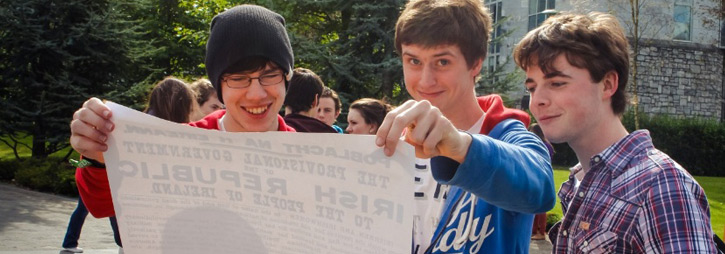Undergraduate Study
Undergraduate Study

The BSc OT Programme is subject to 'Fitness to Practise'. Students are are required to undertake placement and training that involve dealing directly with patients, clients or service users. Since it is of over-riding importance to protect members of the public from harm and to maintain the trust and confidence of the general public in the professions and the University, it is vital that students are deemed fit to practise while on placement. For further information, please see relevant Policies and Procedures, as well as Core Competencies, at fitness to practise
Programme Overview
Year 1: Occupational and Health Across the Lifespan
Topographical AnatomyPrinciples of Human Structure for Clinical TherapiesIntroduction to Development & Social Perspectives on PsychologyFundamentals of PhysiologyPerson Environment Occupation (PEO I)Person Environment Occupation (PEO II)Becoming a Healthcare ProfessionalCreative Occupations & HealthPractice Education I
Year 2: Children and Young People
Developmental Neuro-Anatomy for Occupational TherapyAdvanced Development PsychologyIntroduction to Research MethodsPersonal Professional Development (PPD I)Personal Professional Development (PPD II)Person Environment Occupation (PEO III)Person Environment Occupation (PEO IV)Becoming a Professional Practitioner IPractice Education II
Year 3: Adults and Older People
Applied Neurology for Occupational TherapyPsychological Issues in Middle and Older AdulthoodAdvanced Research MethodsPersonal Professional Development (PPD III)Person Environment Occupation (PEO V)Becoming a Professional Practitioner IIPractice Education III
Year 4: Integrating Knowledge
Integrated Professional PracticeResearch Based ProjectPersonal Professional Development (PPD IV)Practice Education IV
Years 1 - 4
Practice learning is at the heart of the UCC occupational therapy degree programme. Practice Education comprises 1,050 hours (30 weeks) spread throughout the programme in years 1, 2, 3, and 4. Practice education placements take place in hospitals, schools and community settings. Placements are facilitated in the HSE Southern Area which includes Kerry, Cork, Waterford, Kilkenny, South Tipperary, Carlow and Wexford. Where possible one practice of convenience is facilitated in the Cork area or in another county in the HSE Southern Area, if preferred. Modules in third and fourth year contribute to approximately one third of the marks of the final degree.This weighting is indicative of the value given to practice and the development of practice knowledge, skills and attitudes.
The first introductory practice education module takes place in students’ first year in a variety of practice settings. Students are generally allocated in pairs and this placement occurs full time during 2 weeks. In second year, students undertake an 8 week practice education placement typically in settings involving infants, children and/or young adults. Another two modules take place in third and fourth year and each are of ten weeks’ duration. Students may need to travel and/or arrange short-term accommodation near the placement sites. Students will incur the costs of travel to clinical locations as well as the costs of accommodation.
Practice education is delivered through a partnership between the University, the Health Service Executive and voluntary and private sector providers. The extent of this partnership approach to teaching distinguishes practice modules from the other modules within the programme. Practice education modules facilitate a reciprocal relationship of theory influencing practice and practice influencing theory, which is essential for the development to our profession.
Students have the opportunity to participate in the ERASMUS programme which is a European student exchange programme offering students a possibility of studying or working abroad in another country for a period of up to 3 months. Students from the course have successfully completed exchanges to Denmark and Wales.
Calendar of Practice Education Experiences
| Students | Placement Dates | Length of Placement | Clinical Area |
| 1st Year (students attend in pairs) | 26/4/21-7/5/21 | 2 weeks | All areas of OT practice |
| 2nd Year | 26/4/21-18/6/21 | 8 weeks | Paediatric/Young Person practice |
| 3rd Year | 18/1/21-9/4/21 | 10 weeks | Adults/Older Adults practice |
| 4th Year | 28/9/20-4/12/20 | 10 weeks | All areas of OT practice |
The Practice Education team welcomes offers from Occupational Therapists to facilitate students during the above dates
Undergrad Brochure
Mature Aged Applicants Criteria
In 2003, University College Cork (UCC) commenced a new 4- year occupational therapy undergraduate programme. The programme was one of the first in the world to be designed in accordance with the then newly published World Federation of Occupational Therapists Revised Minimum Standards for the Education of Occupational Therapists (2002).
The programme at UCC is underpinned by a firm research evidence base, including six doctoral studies conducted in the UK; findings from a series of focus groups held with local occupational therapists and the writings from contemporary educational literature.
Drawing on this evidence base, an innovative educational approach, namely task-based learning (TBL) was devised and employed as the primary teaching method in the curriculum. Derived from problem-based learning, TBL is extended to include active, situated, and experiential learning leading to the acquisition of knowledge, skills and attitudinal competencies. TBL puts professional practice at the centre of learning in the academic setting and seeks to bridge the practice-theory divide. Thus students develop not only cognitive knowledge and skills but also professional skills and attitudes central to contemporary occupational therapy practice.
Book of Modules, Calendar and Marks & Standards
Click the below link for information on:
- Book of Modules http://www.ucc.ie/modules/
- Undergrad Calendar http://www.ucc.ie/calendar/medicine/med005a.html
- Marks and Standards http://www.ucc.ie/admin/registrar/marksandstandards/
